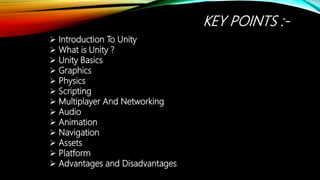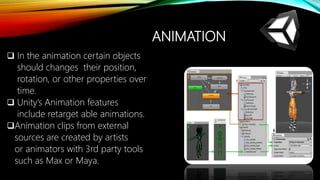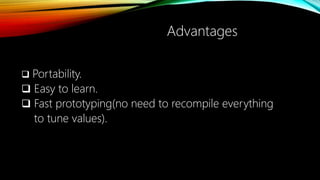Unity 3D game engine seminar
Unity is a cross-platform game engine developed by Unity Technologies,[4] first announced and released in June 2005 at Apple Inc.'s Worldwide Developers Conference as an OS X-exclusive game engine. As of 2018, the engine has been extended to support 27 platforms.[5] The engine can be used to create both three-dimensional and two-dimensional games as well as simulations for desktops and laptops, home consoles, smart TVs, and mobile devices. Several major versions of Unity have been released since its launch, with the latest stable version being Unity 2018.2.2, released on August 10, 2018.[6] Unity gives users the ability to create games in both 2D and 3D, and the engine offers a primary scripting API in C#, for both the Unity editor in the form of plugins, and games themselves, as well as drag and drop functionality. Prior to C# being the primary programming language used for the engine, it previously supported Boo, which was removed in the Unity 5[7] release, and a version of JavaScript called UnityScript, which was deprecated in August 2017 after the release of Unity 2017.1 in favor of C#.[8] The engine has support for the following graphics APIs: Direct3D on Windows and Xbox One; OpenGL on Linux, macOS, and Windows; OpenGL ES on Android and iOS; WebGL on the web; and proprietary APIs on the video game consoles. Additionally, Unity supports the low-level APIs Metal on iOS and macOS and Vulkan on Android, Linux, and Windows, as well as Direct3D 12 on Windows and Xbox One.






















Recommended




























































More Related Content
What's hot (20)








































Similar to Unity 3D game engine seminar (20)






































Recently uploaded (20)






















Unity 3D game engine seminar
- 1. GOVERNMENT POLYTECHNIC, AURANGABAD Information Technology NIKHIL B. THORAT 3rd Year ENROLLMENT NO :167058 GUIDED BY Prof. D.P.SAPKAL
- 3. KEY POINTS :- Introduction To Unity What is Unity ? Unity Basics Graphics Physics Scripting Multiplayer And Networking Audio Animation Navigation Assets Platform Advantages and Disadvantages
- 4. INTRODUCTION TO UNITY Unity is Cross-Platform game engine developed by Unity Technologies. Unity is integrated development environment (IDE) for creating interactive media, typically video games. The first version of unity (1.0.0) was developed by colleagues: David Helgason, Joachim Ante and Nicholas Francis in Denmark. First announced only for OS X, at Apple’s Worldwide Developers Conference in 2005, its has been extended to target 21 platforms.
- 5. WHAT IS UNITY ? Game Engine -- To Create 2D and 3d Games. Unity is GUI System. Unity is 3D Terrain Editor. Accompanying Script editor -- Monodevelop (win/mac) Can also use Visual Studio(Windows) 3D object animation manager.
- 6. UNITY BASICS Unity is equally suited for to creating 2D and 3D games. When you create a new project in Unity, you have the choice to start in 2D or 3D mode. The choice between starting in 2D or 3D mode determines some settings for the Unity Editor ,such as whether images are imported as textures or sprites.
- 7. 2D OR 3D PROJECTS Full 3D :- 3D games usually make use of three-dimensional geometry, with Materials and Textures. 3D games usually render the Scene using perspective, so objects appear larger on screen.
- 8. Orthographic 3D :- Sometimes games use 3D geometry, but use an orthographic camera instead of perspective. Common technique used in games which give you a bird’s-eye view of the action, and is sometimes called “2.5D”.
- 9. • Full 2D :- Many 2D games use flat graphics, sometimes called sprites, which have no three-dimensional geometry at all.
- 10. GRAPHICS Are visual images or designs on some surface. Understanding graphics is key to adding an element of depth to your game. Unity offers amazing visual fidelity :- Lighting Cameras Materials Shaders and Textures.
- 11. PHYSICS An object in a game must accelerate correctly by collisions, gravity and other forces. Unity’s built-in physics engines provide components that handles the simulation for you .With just a few parameter settings. Rigid Body is used for object physics.
- 12. SCRIPTING Unity implements a MONO Compiler. Scripts can be written in JavaScript C# Beyond that, scripts can be used to create graphical effects to control the physical behaviour of objects . Even implement a custom AI system for characters in the game.
- 13. MULTIPLAYER AND NETWORKING Multiplayer Networking is inherently detailed and complex. There are particular issues and difficulties associated with synchronizing and communicating . Unity’s built-in Multiplayer Networking and the associated High Level API (HLAPI).
- 14. AUDIO A game would be incomplete without some kind of audio, be it background music or sound effects. Including an “ Ambisonic Audio”. Audio Recording for gaming, Unity can access the computer’s microphones from a script and create “Audio Clips” by direct recording.
- 15. ANIMATION In the animation certain objects should changes their position, rotation, or other properties over time. Unity’s Animation features include retarget able animations. Animation clips from external sources are created by artists or animators with 3rd party tools such as Max or Maya.
- 16. NAVIGATION Allows you to create character that are intelligent. By scene geometry, meshes are created automatically. Navigation support Dynamic obstacles .
- 17. ASSETS An asset is representation of any item that can be used in your game or project. Asset Store It is home to a growing library of free and commercial assets. Wide variety of assets are there, For example 3D models, materials, textures, audio, scripts, and fonts.
- 18. PLATFORM The platforms are listed as the following: 1. iOS 2. Windows 3. Android 4. PlayStation Etc.
- 19. Portability. Easy to learn. Fast prototyping(no need to recompile everything to tune values). Advantages
- 20. Disadvantages Less performance in general than a unreal engine. More suited for cross-platform games. Managed Programming Languages – Java Script, C#.
- 21. ANY QUESTIONS ?
- 22. THANK YOU









